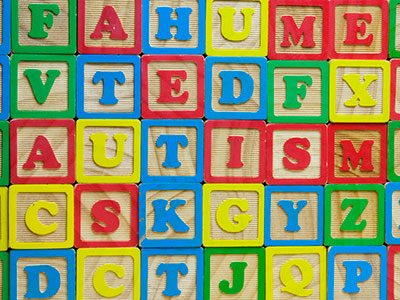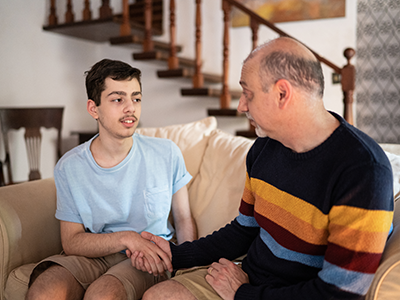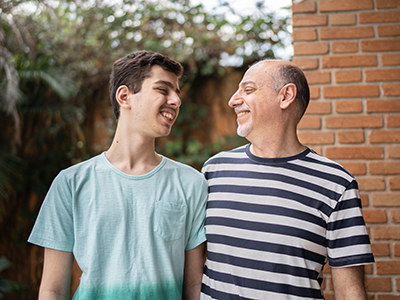Children who have difficulty with social communication and behavior are said to have an autism spectrum disorder (formerly known as a pervasive developmental disorder (PDD)). There may be large differences between individuals with these disorders, and symptoms and difficulties occur along a continuum, or spectrum. The continuum may include a child with autism who does not find social interaction rewarding on one end, and another child who is very sociable on the other. Some children with ASD have an intellectual disability, while others have higher than average intelligence. ASD is found in children of all racial/ethnic groups and socioeconomic backgrounds. It occurs in both boys and girls, but is more common in boys.
Most children with problems in development have only one or two areas of disability. Children with ASD, however, have problems in multiple areas, particularly:
- Social interaction
- Communication
- Flexibility
- Imagination
What are the symptoms of autism spectrum disorder?
Children with ASD often do not show any signs of the disorder for the first few months of life, but begin to display symptoms as they age. The first symptoms of ASD are most commonly seen between the ages of 12 and 24 months, although some children may not show clear signs until later ages. Delayed language development is a common reason many children with ASD are originally brought in for evaluation, but not all children with ASD have delayed language development. Signs of autism include problems with social communication and restricted/repetitive behaviors and interests. Behavioral problems are also common in children with ASD. More information about the symptoms of ASD can be found on the following websites:
What is the cause of autism spectrum disorder?
Parents are not responsible for this condition. Although many years ago doctors believed that an abnormal relationship between the infant and his/her parents caused ASD, we now know this is not true.
Scientific evidence has strongly refuted the theory that the MMR (measles, mumps, rubella) vaccine or preservatives used in vaccines (thimerosal) cause ASD. Vaccines are an important part of maintaining your child’s health and do not lead to any increased risk of developing ASD.
Autism spectrum disorder is a brain-based disorder with a strong genetic component. The specific nature of the brain dysfunction is poorly understood. It has been found in children with brain abnormalities such as congenital rubella syndrome, neurofibromatosis and tuberous sclerosis. It may also be present with genetic syndromes such as Fragile X Syndrome and phenylketonuria (PKU).
Your child’s doctor may perform lab tests to rule out these and other medical problems associated with ASD. As with all children struggling to develop communication, an evaluation by an audiologist to check your child’s hearing may be necessary. However, most children with ASD are found to have normal health and no medical reason for the symptoms.
There is no specific medical test to diagnose ASD. Your healthcare provider may also want to screen your other children for symptoms and may recommend a genetic evaluation.
How is autism spectrum disorder diagnosed?
Autism spectrum disorder is diagnosed after a qualified professional has performed a complete diagnostic evaluation. The evaluation usually includes gathering a developmental history from the child’s parents, along with direct observation and assessment of the child’s behavior, social-communication skills, and overall development. The evidence shows that ASD is best evaluated by a multi-disciplinary program, including psychology, psychiatry, developmental pediatrics, speech-language pathology, genetics and related disciplines. Evaluation for ASD should be completed as soon as signs emerge. Diagnosis can occur in very young children and toddlers, but in some cases ASD may go unrecognized until later childhood or even adolescence or young adulthood.
What is the treatment for autism spectrum disorder?
Early intensive treatment can have a significant impact on future academic, behavioral and adaptive success.
The treatment of children with ASD focuses on educational and behavioral therapies. Even very young children can benefit from the cognitive-behavioral and developmental therapies designed specifically for children with social and communication problems and their families. Special teachers and classrooms can help older children improve their academic performance and social skills.
Although some children with ASD are also intellectually disabled, many others have average or above average intelligence. Regardless of their cognitive level, all children with ASD can learn – they simply learn differently than other children. It is important to contact your local school district before your child starts school to discuss how to meet your child’s learning needs. Children with ASD usually require special education supports and services. Children ages birth to 3 years are often eligible for early intervention services. Children over the age of three are often eligible for special education services. Contact your local school district for more information.
A team of professionals will help evaluate your child and put a treatment plan together. You may also ask your doctor to review the plan. Ask and find out about all the services that may be available for your child.
Medical treatment for ASD sometimes includes the prescription of medications. Mood- or behavior-altering medications may improve behaviors that can cause self-injury or interfere with school or social ability. These medicines must be prescribed by a doctor experienced with their use in children with ASD. However, no medication has been found that will eliminate the symptoms of ASD. Don’t forget that children with ASD have the same healthcare needs as any other child and benefit from the same health care and disease prevention activities.
More information about evidence-based treatments for ASD can be found on the following websites:
Parents of children with ASD often learn of new or alternative treatments through their friends, the media or the internet. Some alternative treatments may actually be harmful for your child or take valuable time and resources away from scientifically proven treatments. Consult your doctor before deciding to use any treatment.
Where can my family get help and support?
When parents hear that their child has ASD, they may feel overwhelmed. Many families find that professional guidance can help them learn how to best help their child achieve their full potential.
Parents should explore community and governmental resources, as well as local support groups composed of families who have children with similar difficulties. Parents can access these groups via their doctor, school, therapy program or national and local support organizations. These groups share common concerns and offer solutions to problems. Families may wish to consult the CASD Helpful Websites Page for a list of national organizations that can provide more information and support.
 https://riseandshine.childrensnational.org/wp-content/uploads/2025/06/boy-with-concussion-Feature.jpg
300
400
Danielle Robbins
https://riseandshine.childrensnational.org/wp-content/uploads/2017/11/childrens_riseandshine_logo.jpg
Danielle Robbins2025-06-11 11:47:322025-06-11 11:47:32Concussions in Autistic children
https://riseandshine.childrensnational.org/wp-content/uploads/2025/06/boy-with-concussion-Feature.jpg
300
400
Danielle Robbins
https://riseandshine.childrensnational.org/wp-content/uploads/2017/11/childrens_riseandshine_logo.jpg
Danielle Robbins2025-06-11 11:47:322025-06-11 11:47:32Concussions in Autistic children




















Leave a Comment
Want to join the discussion?Feel free to contribute!